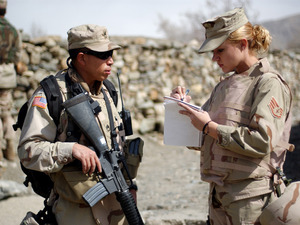* By Terry Gildea NPR *

According to recent VA statistics, PTSD and depression are the top disability claims among America’s female veterans — many of whom served in Iraq and Afghanistan. But many of them have trouble proving that they saw combat — a key to getting treatment for Post-Traumatic Stress Disorder.
A decorated war veteran, Marti Ribeiro’s return to America — marked by a divorce and bouts of anxiety — highlights the struggles many female veterans face. Ribeiro, 30, spent eight years in the Air Force, achieving the rank of staff sergeant. She served tours in both Iraq and Afghanistan. Sitting for an interview recently, Ribeiro smoked a cigarette, looking both tired and nervous.
In 2006, she was embedded with the Army’s 10th Mountain Division in Afghanistan as a military journalist, covering the unit’s humanitarian mission. But on many occasions, Ribeiro, a slender woman with hazel eyes and blond hair, had to drop her camera and pick up her rifle.
Of the attacks on her unit, Ribeiro said, “We were hit with mortars and RPG [rocket-propelled grenades] and it ranges from IED’s on our convoys to a lot of small-arms fire.”
A Troubled Return
Ribeiro was awarded the Army’s Combat Action Ribbon, but the medal did little to slow the mounting chaos in her life. She was getting ready to separate from the Air Force and return to her husband and young daughter in the United States when her husband filed for a divorce.
Shaken by the tension and grief of combat, Ribeiro came home to take on her new role as a single parent. She recalls being overwhelmed by stress and anxiety.
“It’s like having a burning sensation in the pit of your stomach that doesn’t ever go away,” she said. “You become very paranoid in that sometimes you feel like people are out to get you.”
Ribeiro was diagnosed with post-traumatic stress disorder by military doctors at a hospital in San Antonio, where she was stationed. She says doctors recommended she apply for benefits through the Department of Veterans Affairs. More than 40 percent of America’s female veterans have enrolled in the agency’s health care plan.
After being discharged, Ribeiro moved to Oklahoma City with her daughter, and her symptoms got worse. According to her VA medical records, her PTSD claim was approved — but when she tried making an appointment at the local clinic, another battle began.
Read more at NPR
ATTENTION READERS
We See The World From All Sides and Want YOU To Be Fully InformedIn fact, intentional disinformation is a disgraceful scourge in media today. So to assuage any possible errant incorrect information posted herein, we strongly encourage you to seek corroboration from other non-VT sources before forming an educated opinion.
About VT - Policies & Disclosures - Comment Policy



